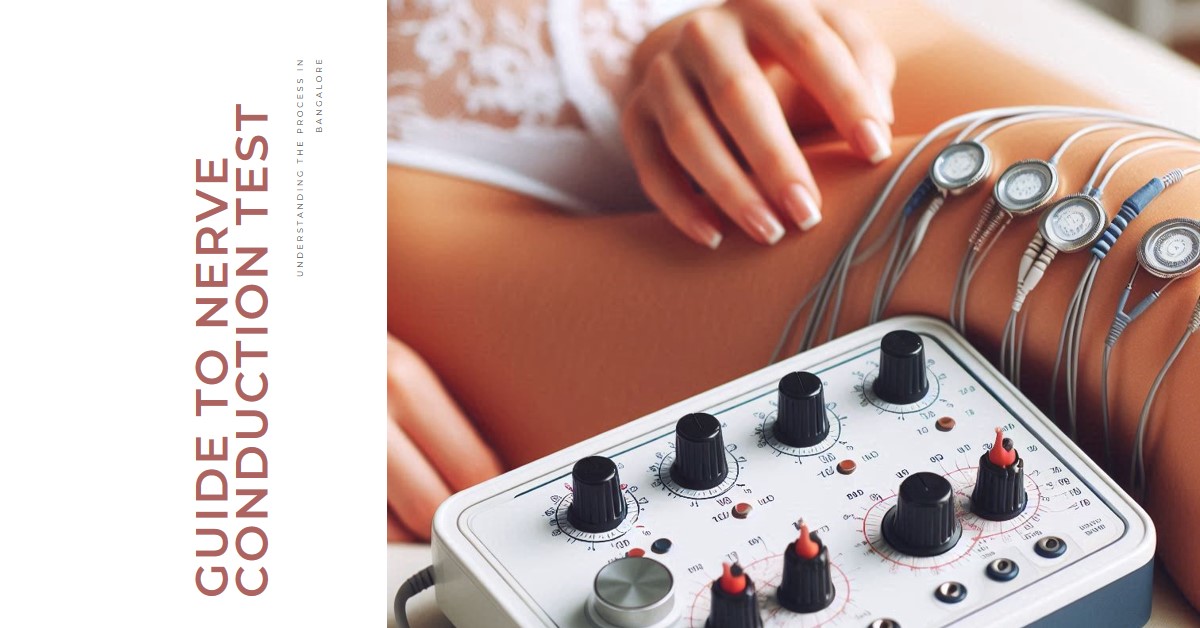Nerve Conduction Velocity Test in Bangalore: Comprehensive Guide

Nerve conduction velocity (NCV) testing is an essential diagnostic tool that plays a crucial role in assessing nerve function and identifying various neurological conditions. This test helps doctors evaluate how well electrical signals move through the nerves, making it valuable for diagnosing conditions like carpal tunnel syndrome, peripheral neuropathy, and other nerve-related issues. In Bangalore, the availability of advanced healthcare facilities ensures that patients can receive top-quality diagnostic services to help detect and treat nerve problems early.
If you’re considering a nerve conduction velocity test in Bangalore, this guide will walk you through everything you need to know about the procedure, its importance, benefits, and how to find the right diagnostic center for your needs.
What is a Nerve Conduction Velocity (NCV) Test?
A nerve conduction velocity test measures the speed at which electrical impulses travel along the nerve fibers. It helps doctors assess the function of the peripheral nervous system, which includes all the nerves outside the brain and spinal cord. The test is typically performed alongside an electromyography (EMG) test to provide a comprehensive view of the nerve and muscle health.
Why is NCV Testing Important?
NCV testing is critical for diagnosing a wide range of conditions that affect the peripheral nervous system. It helps healthcare professionals identify:
- Carpal Tunnel Syndrome: This condition is caused by compression of the median nerve at the wrist. NCV testing helps assess how well the nerve conducts electrical signals and determines the extent of the nerve damage.
- Peripheral Neuropathy: This disorder involves damage to the peripheral nerves, often due to diabetes, infections, or toxins. NCV testing can identify areas of nerve damage and help in determining the underlying cause.
- Guillain-Barré Syndrome: This is an autoimmune disorder that attacks the peripheral nervous system. NCV testing is essential in evaluating the nerve function during the diagnosis.
- Chronic Inflammatory Demyelinating Polyneuropathy (CIDP): CIDP is a condition where the immune system attacks the nerves. NCV tests help doctors evaluate nerve health and make treatment decisions.
- Nerve Compression or Injury: NCV tests are useful in diagnosing nerve injuries caused by trauma or compression from nearby structures like bones or muscles.
By measuring nerve conduction velocity, doctors can determine the presence of nerve damage and its severity, making it easier to plan effective treatments.
How is the Nerve Conduction Velocity Test Performed?
The procedure for an NCV test is non-invasive and relatively simple. Here’s a step-by-step breakdown:
- Electrode Placement: Small electrodes are placed on the skin over the nerve being tested. One electrode stimulates the nerve with a mild electrical impulse, while the other records the nerve’s response.
- Electrical Stimulation: A small electrical shock is applied to the nerve to stimulate it, usually on the wrist, elbow, ankle, or knee, depending on the area being tested.
- Recording the Response: The response of the nerve to the electrical stimulus is recorded by the second electrode. The time it takes for the signal to travel along the nerve is measured.
- Interpretation: The recorded data is analyzed by the doctor to assess the nerve’s health. A slower-than-normal conduction velocity may indicate nerve damage, while a normal result suggests that the nerves are functioning properly.
The test usually takes between 30 minutes to an hour, and patients can resume normal activities immediately after.
What Are the Benefits of NCV Testing?
There are numerous benefits to undergoing an NCV test, especially if you are experiencing symptoms of nerve issues. These include:
- Accurate Diagnosis: NCV testing provides precise data on the condition of the nerves, which is invaluable for diagnosing various neurological disorders.
- Early Detection: By identifying nerve damage early, patients can receive timely treatment to prevent further damage and improve outcomes.
- Non-invasive and Safe: The NCV test is non-invasive, which means there are no incisions or needles involved. The electrical impulses used during the test are mild and safe for most people.
- Guides Treatment: The results from the NCV test help doctors make informed decisions about the most effective treatment plan, whether it’s medication, physical therapy, or surgical intervention.
Preparing for a Nerve Conduction Velocity Test in Bangalore
Before undergoing an NCV test, there are a few things to keep in mind to ensure accurate results:
- Avoid Oily Skin: It’s recommended to clean the skin over the area where electrodes will be placed. Oily skin can interfere with the electrodes’ ability to record accurate data.
- Medications: Inform your doctor about any medications you’re taking, especially those that could affect nerve function or muscle activity, such as painkillers, antidepressants, or sedatives.
- Clothing: Wear comfortable clothing that allows easy access to the areas being tested, such as your arms, legs, or back.
Your healthcare provider will give you specific instructions based on your condition and the area of the body being tested.
Finding a Reliable Provider for NCV Testing in Bangalore
Bangalore is home to many top-tier medical centers and diagnostic labs offering nerve conduction velocity tests. When looking for a facility, consider the following factors:
- Accreditation and Reputation: Choose a diagnostic center with accreditations from recognized healthcare bodies. Look for patient reviews and testimonials to ensure quality care.
- Experienced Neurologists: A neurologist with experience in conducting NCV tests can provide accurate diagnoses and tailored treatment plans.
- Advanced Equipment: Ensure that the center uses the latest technology and equipment for nerve conduction testing, as this improves accuracy and efficiency.
- Comfort and Care: Choose a clinic known for providing a comfortable and caring environment, especially if you’re anxious about the procedure.
Some of the leading diagnostic centers and hospitals in Bangalore offer nerve conduction velocity tests. If you’re looking for the best providers, you can start by searching for trusted hospitals like Manipal Hospital, Sakra Premium Hospital, and the NIMHANS (National Institute of Mental Health and Neurosciences), which are known for their world-class neurology departments.
Common Conditions Diagnosed with NCV Testing
Here are some of the common neurological conditions that can be identified or evaluated through nerve conduction velocity testing:
- Diabetic Neuropathy: Diabetes can lead to nerve damage, especially in the feet and hands. NCV testing is crucial for diagnosing this condition early.
- Multiple Sclerosis: MS is an autoimmune disorder that affects nerve function in the brain and spinal cord. NCV tests can help assess the extent of nerve damage.
- Hereditary Neuropathies: Conditions like Charcot-Marie-Tooth disease affect nerve function and are often diagnosed with the help of NCV tests.
- Tarsal Tunnel Syndrome: Similar to carpal tunnel syndrome but affecting the ankle, this condition is diagnosed through NCV testing.
By identifying these conditions early, patients can receive the appropriate care and prevent further nerve damage.
FAQs About Nerve Conduction Velocity Test in Bangalore
1. Is the nerve conduction velocity test painful?
The test is generally painless. You might feel a slight tingling or discomfort when the electrical impulses are applied, but it is typically not painful.
2. How long does it take to get results from an NCV test?
Results are typically available within a few hours to a day, depending on the diagnostic center. Your doctor will discuss the findings with you during a follow-up consultation.
3. Are there any risks involved with the NCV test?
NCV testing is considered safe for most people. However, if you have certain conditions, such as a pacemaker or other implanted devices, you should inform your doctor before the test.
4. How much does a nerve conduction velocity test cost in Bangalore?
The cost of an NCV test can vary depending on the diagnostic center, but on average, it may range from ₹2,000 to ₹5,000. Always check with the facility for accurate pricing.
5. Can NCV testing detect all nerve problems?
While NCV testing is highly effective for diagnosing various nerve issues, some conditions may require additional tests, such as MRI or blood tests, for a comprehensive diagnosis.
Conclusion
The nerve conduction velocity test in Bangalore is an invaluable diagnostic tool for assessing nerve function and identifying various neurological disorders. Whether you’re experiencing symptoms like numbness, tingling, or weakness, an NCV test can help diagnose the underlying cause and guide treatment. By choosing a reputable diagnostic center with skilled professionals and advanced equipment, you can ensure accurate and timely results that are crucial for your health.
If you’re concerned about your nerve health or need to book a nerve conduction velocity test, consult with a trusted medical provider in Bangalore. Early detection can make a significant difference in managing and treating nerve-related conditions effectively.
Have you experienced symptoms related to nerve issues? Don’t wait – consider getting a nerve conduction velocity test today.
Also know Ultrasound Services in Bangalore: Comprehensive Guide to High-Quality Diagnostic Imaging


